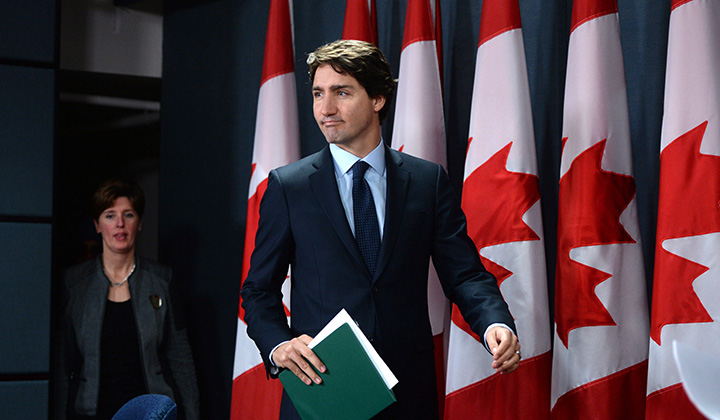OTTAWA – Prime Minister Justin Trudeau is backing away from a campaign vow to balance the public books before the end of his government’s four-year mandate – a pledge that was central to the Liberal election platform.

As a result of a weakening economy, the government’s upcoming 2016-17 budget plan will show a deficit larger than the Liberals’ promised $10-billion shortfall cap, Trudeau told Montreal’s La Presse newspaper.
Just how big that deficit will be remains unclear.
If the economy continues to deteriorate, it will be difficult for the Liberals to live up to their pledge to balance the books in 2019-20, Trudeau said in the interview published Thursday.
READ MORE: Has Trudeau’s Liberal government delivered 100 days in?
Less than two months ago, Trudeau insisted that the Liberal plan to make good on that key balanced-budget promise was “very” cast in stone.
The doubts raised by Trudeau offer a glimpse of the fiscal pressure faced by the Finance Department as it crafts the government’s first federal budget, expected late next month.
“If we look at the growth projections for the next three or four years, it will be difficult (to return to balance),” Trudeau was quoted by La Presse as saying.
READ MORE: Deficits could total $90B over Liberals’ first mandate
- What is a halal mortgage? How interest-free home financing works in Canada
- Capital gains changes are ‘really fair,’ Freeland says, as doctors cry foul
- Budget 2024 failed to spark ‘political reboot’ for Liberals, polling suggests
- Tesla’s net income drops 55% in first quarter amid falling global sales
“But everything we’re doing is aimed at creating economic growth. When predicting the level of growth four years in advance, governments often miss the target.”
Trudeau said the Liberal government still intends to fulfil its other, more flexible “fiscal anchor” – lowering the debt-to-GDP ratio in every year of its mandate.
By zeroing in on debt-to-GDP, economists say the Liberals could run annual deficits of up to $25 billion in the coming years and still push the ratio downwards, as long as the economy grows at a decent pace.
READ MORE: Trudeau and UN chief Ban Ki-moon to talk climate, refugees, peacekeeping
The Liberals have promised to run deficits in the coming years in order to be able to spend billions on projects like infrastructure, which they predict will create jobs and help revive the economy.
Along with infrastructure spending, the Liberals have also pointed to their other economy-boosting plans. They include cutting taxes for middle-income earners – offset in part by raising taxes on the highest earners – and revamping child benefits so they help more families.
Those measures, however, will lower revenues destined for the public treasury over the coming years.
At a news conference later Thursday, Trudeau dodged questions about whether his government would be able to balance the budget in four years.
“We continue to recognize that the Canadian economy is facing real challenges in terms of growth, in terms of jobs for the middle class,” Trudeau said after a meeting with UN Secretary General Ban Ki-moon.
“Our entire framework is about turning around the low-growth rates that Canada has been facing. And we’ve seen, with falling oil prices, that there is a trajectory that continues to look difficult for Canada.”
Ottawa’s goal is to generate the kind of growth that will benefit not just the federal balance sheet, but the entire economy, he added.
During the fall election campaign, Trudeau promised to keep deficits below the $10-billion mark in 2016-17 and 2017-18 unless the economic situation got radically worse.
“Yes, we will go over $10 billion,” he told La Presse. “By how much? We are in the process of examining that.”
Interim Conservative leader Rona Ambrose blamed “out-of-control Liberal spending” for breaking the $10-billion deficit promise.
“Unfortunately, it is today’s Canadian families – and generations to come – who will pay the price for Liberal mismanagement,” Ambrose said in a statement.
In recent months, the Canadian economy has sputtered in large part due to the steep drop in commodity prices.
On Wednesday, a National Bank of Canada report said the country’s fading economic prospects could put the Liberal government on track for $90 billion in deficits over its four-year mandate.



Comments